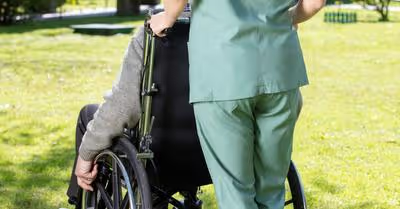Table of Contents
Who Meets Assisted Living Criteria?
As you age, it is normal to find yourself needing an additional hand with certain things. We can’t keep up areas of the house and sometimes they go into disrepair. Carrying that laundry basket up and down the steps becomes more of a hassle than ever before. Sometimes, even daily living activities like bathing, walking, and grooming become things that take so much more time than they had before. When you’re starting to experience these hiccups, you stop and think- maybe it’s time to downsize and find some assistance with things.
This is where assisted living comes in. Most assisted living communities offer similar amenities that address these areas of need- laundry services, housekeeping on a regular schedule, and maintenance. Cooking and preparing most of your meals is also an area where assisted living can be beneficial. Occasionally, transportation benefits are also enjoyed by those residing in an assisted living community.
All assisted living communities evaluate the same arenas of care when it comes to evaluating who fits their criteria and who does not. These main areas are mobility, level of medical care needed, and level of overall assistance needed.
Mobility
Mobility refers to your ability to get around independently. Most assisted living communities evaluate this and look for the ability to get yourself up and around in your own private apartment without too much additional assistance. Typical assisted living residents are able to walk independently, with or without assistive devices- canes, walkers and things along those lines are all acceptable assistive devices to assist in mobility. Rarely, an assisted living community will admit residents who require a wheelchair for mobility- it would depend on the resident’s ability to get in to and out of the wheelchair independently and their ability to maneuver it around safely and effectively.
Prospective residents of an assisted living facility that have a higher level of mobility assistance required need to be evaluated on a case-by-case basis by facilities. There are always exceptions to every rule and regulation, and an individual may be accepted into assisted living placement with higher level mobility needs if certain other criteria are met. There are also specific communities that cater to clients with high mobility needs but low areas of needs in other ways- medically, house upkeep, etc. It is always worth reaching out to a community to find out their specific requirements and what leeway they can afford.
Level of Medical Care
Residents of assisted living communities tend to be in fairly good shape when it comes to their health. Facilities in assisted living designation do typically have some medical oversight, usually by way of a nurse on staff to evaluate the residents on a regular basis. These residents can not require daily skilled nursing services, however. Skilled nursing services include advanced care items like wound care, tube feeding and items of that nature. Assisted living community nurses oversee more case management level of care items- coordinating healthcare appointments, ensuring medications that are passed and provided by assisted living care staff are appropriate and have appropriate amounts on-hand, etc.
Prospective residents who require extensive medical oversight may find difficulty in getting accepted into an assisted living environment. Clients with advanced medical diagnoses like unmanaged diabetes, advanced COPD, uncontrolled hypertension and similar diagnoses will find that their medical oversight may exceed what is available in an assisted living community. A higher level of care facility, such as a skilled nursing facility, may be a more appropriate placement for these levels of needs.
Overall Assistance Level
Assisted living communities are exactly as advertised- living arrangements that provide some basic assistance with day to day living. The level of assistance required by a resident is typically minimal- oftentimes, a resident is very independent and able to perform a multitude of tasks by themselves without additional oversight. Each individual property has its own guidelines as to what level of care they can provide for a resident, but most have basic minimums that a client must meet to be eligible for their community.
Most assisted living communities have residents who need help with basic daily care. This minimum level of assistance required needs to be met to qualify for an assisted living community, but it can not exceed certain thresholds, either. If a person is unable to manage their medications, bathe themselves safely, cook meals safely or often, and needs help with housekeeping items and laundry, but are otherwise cognitively intact without major mobility or health concerns, they would be considered a perfect candidate for assisted living.
An important aspect to consider with assisted living is cognitive ability. Most often, people with mild cognitive impairment- such as those with early dementia- can live in an assisted living community without an issue. Most assisted living communities are set up to provide a level of supervision that would be appropriate for mild cognitive impairment- there are secure systems set up and surveillance on the grounds to help ensure somebody with mild dementia is safe within the community.
When you enter into moderate cognitive impairment, such as with advancing dementia, an assisted living community has difficulty providing care for that individual. Ultimately, there are many assisted living facilities set up these days to provide care to advancing dementia patients, and if you have a moderate impairment, you should be evaluating facilities that fall within the “memory care” spectrum of facilities in order to meet your specific care needs. These facilities employ specially trained employees who have certifications and background in providing care to clients with moderate to severe cognitive impairment, and can provide the safest environment for the level of care needed.
Ultimately, any assisted living community will have their own specific set of admission criteria that you must meet in order to qualify for placement there. Knowing your own health status, level of care needed, and abilities that you can provide for yourself will be important in identifying exactly which level of care is right for you. Reach out to a facility of interest and find out if they’re a right fit for you!
Recent Articles













